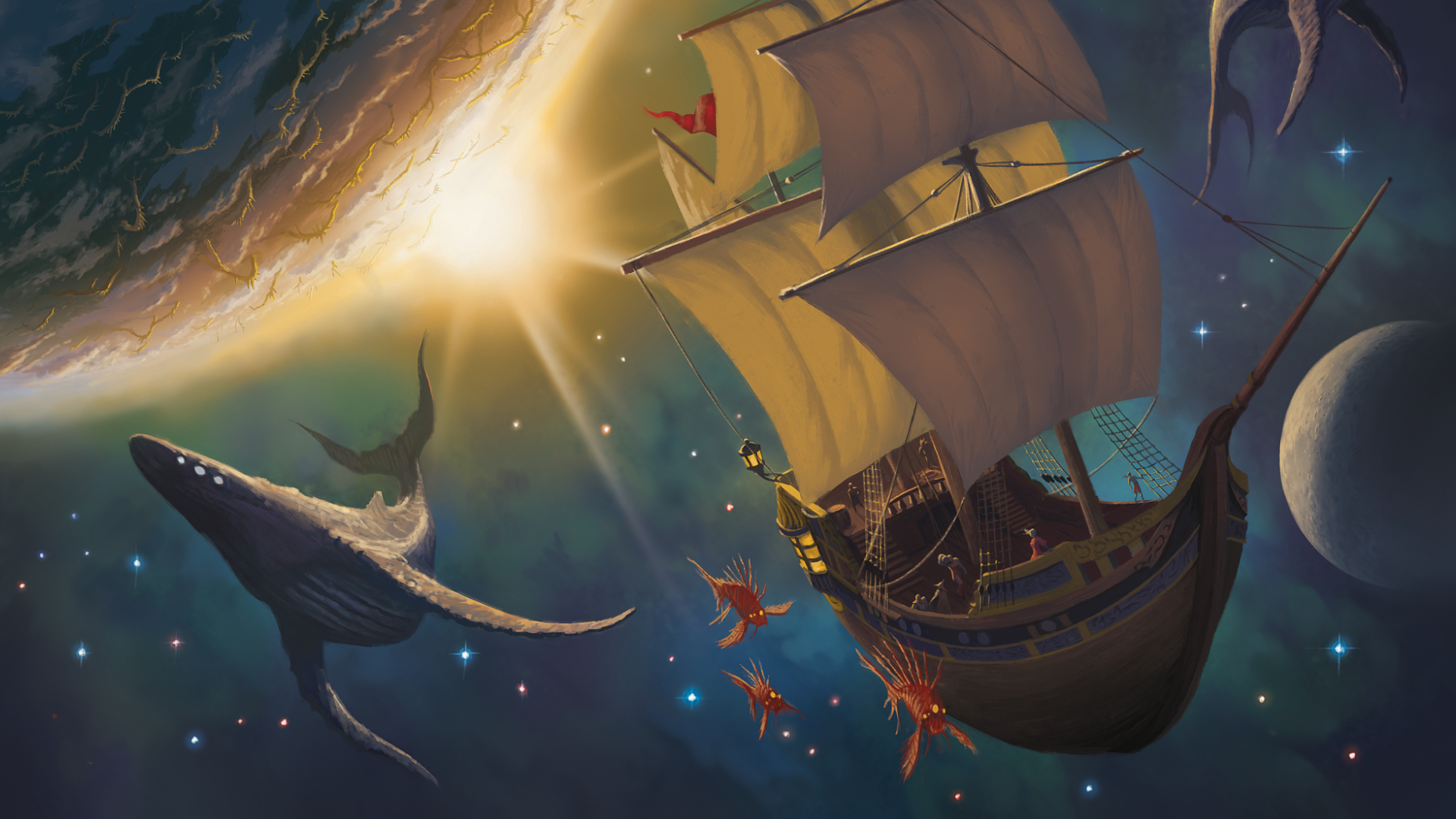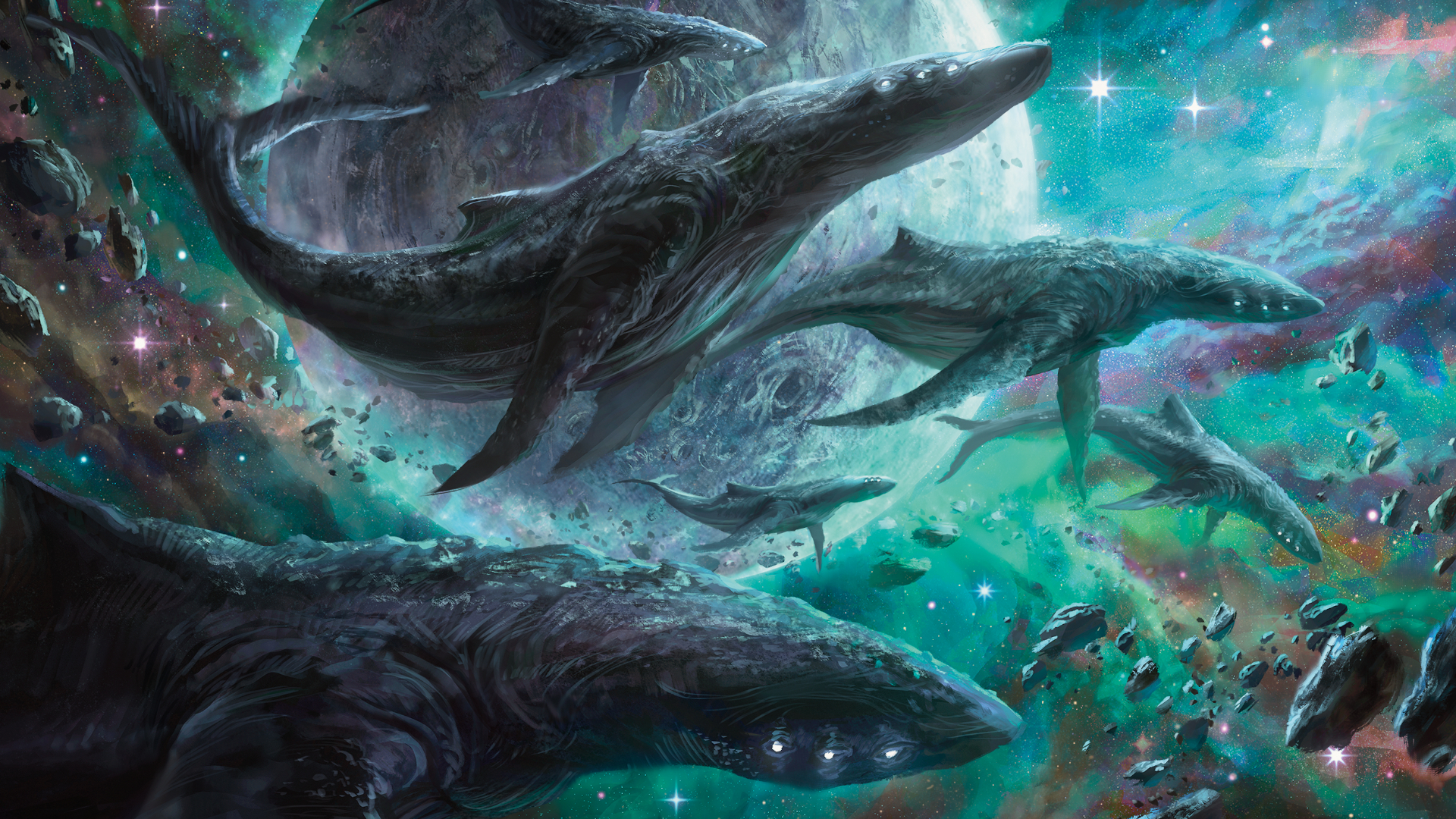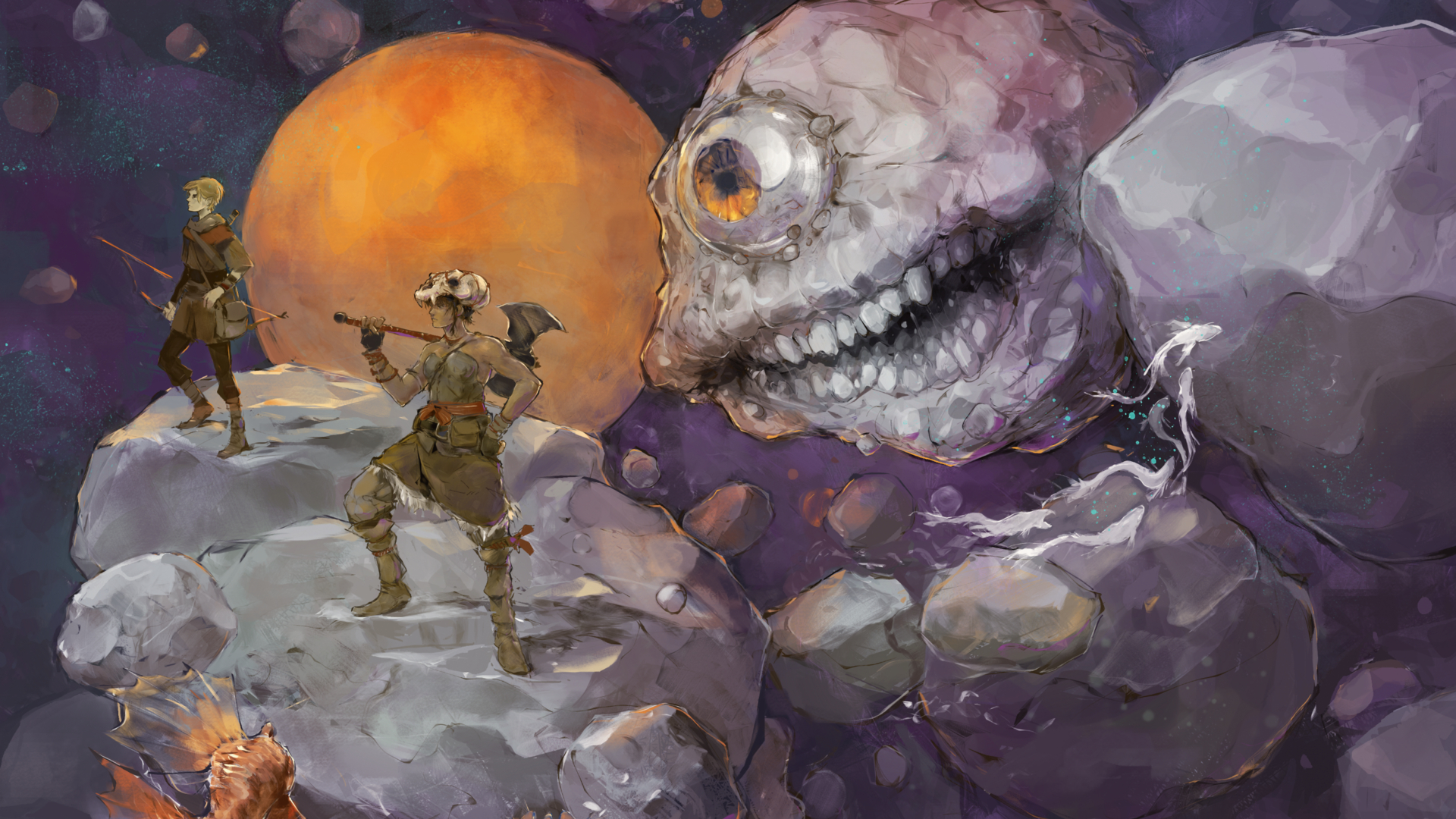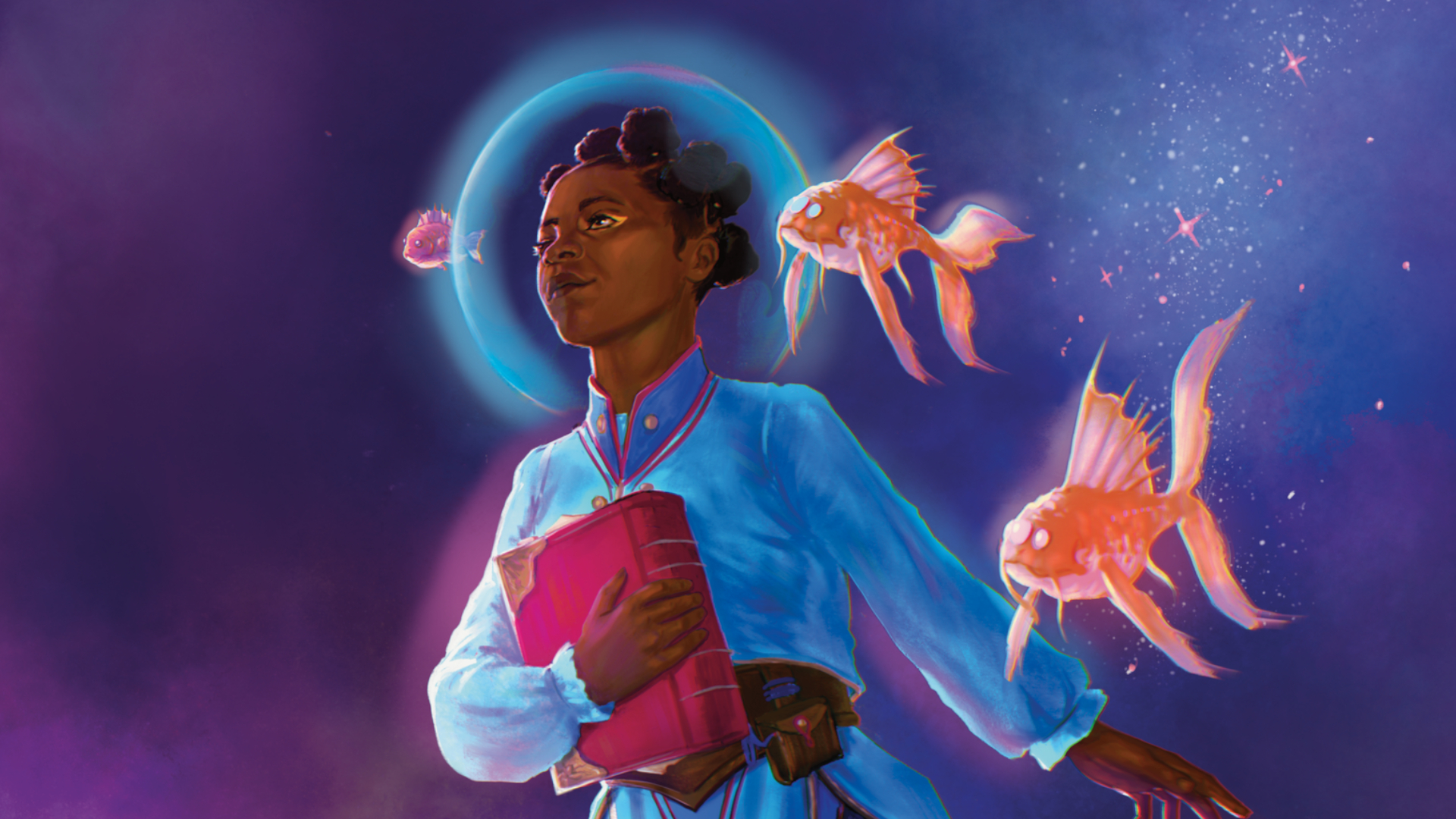Spelljammer explained - how this bizarre setting fits into the D&D universe
Spelljammer: Adventures in Space isn't as big a departure as you might think

It says a lot about how beloved the setting is that "Spelljammer confirmed" became such a long-running meme. Even though its blend of sci-fi fantasy hadn't been seen in decades (officially, at least), you couldn't get through a Dungeons and Dragons announcement without the now-infamous phrase being dropped into comments. In fact, D&D's official account made it an April Fool's joke for 2022.
Fast-forward a few months and we actually have to grapple with how Spelljammer fits into today's D&D lineup. If the likes of flintlock-wielding hippo aliens exist in - and have visited - the world of knights on horseback, how come we haven't heard about them? There's an obvious real-world explanation, of course, but it does raise questions in-universe. Modern Dungeons and Dragons books have stayed mum about the floating asteroid city that's supposed to orbit one of the setting's moons, for instance.
To help set the record straight, lead designer Chris Perkins chatted with us during a press briefing to discuss how Spelljammer: Adventures in Space integrates with existing D&D mythology, what it carries over from the classic version, and what it changes. Basically? This isn't the Spelljammer from days gone by - it might be better, and is arguably one of the most interesting additions to D&D for a long time.
Ocean of stars

If you're new to the setting, Spelljammer is best described as a cross between Disney's (very underrated) Treasure Planet, classic pirate adventures, and the swords n' sorcery action D&D is known for. However, rather than keeping the action terrestrial, it zooms out and takes in a wider universe - quite literally.
"If you are on a planet, and you hop aboard a Spelljamming vessel, and you head into space, you are entering the vast ocean that is Wild Space," Perkins says. "If you continue outward to the edge of your system... you start to enter or see around you this silvery haze, and the brilliant colors of Wild Space give way to a silvery, purplish void through which the light of the stars of other Wild Space systems shine. At that point you are crossing into the Astral Sea, the Astral Plane, which is a realm of thought given form."
There is a great discovery to be had
Chris Perkins
While there's plenty to do in the Astral Plane (this in-between realm is inhabited by all sorts of bizarre creatures), pushing through allows you to reach other solar systems with entirely different worlds from the D&D franchise. In short, this allows an adventurer from the Dungeons and Dragons starter set to hop on a Spelljammer ship and travel to the alternate steampunk reality of Eberron. It's a neat, in-universe way of moving your character from one campaign setting to another without having to start afresh.
However, that isn't to say this is common knowledge in-universe. When I asked Perkins about how the team integrated Spelljammer back into D&D lore (and how they avoided it upending the status quo with advanced spacecraft changing everything for a feudal society), he compared it to a medieval villager's macro view of the world.
Weekly digests, tales from the communities you love, and more

The original 1989 version of Spelljammer was a little different to this modern take. Rather than using Wild Space and the Astral Plane, it relied on 'crystal spheres' where entire solar systems were contained inside an enormous shell (a bit like the finale of Men in Black where the camera pulls back to reveal our galaxy held within a marble). Travellers could find a gateway that would take them out of the sphere and into a flammable, gas-like 'phlogiston' surrounding yet more crystal spheres, but these ideas were dropped to better fit Spelljammer into modern D&D's cosmology.
"If you take your average medieval peasant who lives somewhere in central Europe, they're probably not going to know anything about the continent of Australia," Perkins explains. "It's too far, they've never been there, they've probably never been five miles outside of their town, and so to them it's meaningless... but, guaranteed there's probably somebody in Europe who does know something about Australia. That's the analogy I use here. If you talk to your average person in rustic Forgotten Realms [where many D&D adventures are set], they probably don't know that space is this great ocean they can voyage into using magic. They've never even encountered it. But [classic character] Elminster, or some other wizard, or a good number of people in [the city of] Waterdeep may have actually had contact with Spelljamming creatures or Spelljamming ships."
While it is of course down to the person running the game to decide how much knowledge its world would have, Perkins says that he doesn't think "the majority of people on most our worlds know that this is a method of transit that exists. So there is a great discovery to be had".
Fantasy future

That's why Adventures in Space assumes players know nothing about Spelljammer, and also why Spelljammer Academy - a one-off adventure that introduces the idea to modern players - came about. It puts players and characters in the same situation, where they can learn about this entirely new world beyond the horizon together.
Speaking of entirely new worlds, Perkins and co were keen to avoid technological science fiction here. More than a few of the best tabletop RPGs have that covered, so the key was maintaining a sword and sorcery theme which still felt fundamentally D&D.
"One of the things we tried to do with Wild Space to make it feel like a fantasy setting and not a science fiction setting was to think of it more like an ocean of our world with color and life so that it's very clear as soon as you enter it that you're not in 2001: A Space Odyssey," Perkins reveals.
With that in mind, they leaned into Spelljammer's Treasure Planet-style approach of filling space with all things nautical. That's why its ships take the form of galleons or vessels inspired by sea life you'd find under the waves.
A realm of thought given form
Chris Perkins
Equally, it's why you'll see Spelljammer citizens wielding cutlasses instead of Star Wars-esque blasters. Besides keeping things grounded in the D&D reality we've come to know since the 1970s, there's less need for mechanical gizmos if magic exists. As an example, equipping your ship with laser weapons or cannons isn't necessary when player characters can throw literal lightning.
That train of thought extends to the new races you can use - and the monsters you'll encounter - throughout Spelljammer: Adventures in Space. While there are robotic auto gnomes and oozing, amorphous plasmoids, they're still very grounded in the fantasy seen amongst the pages of other books. Star-faring astral elves are a common sight, and creatures inspired by the ones found in classic fantasy, such as cosmic spiders the size of a comet, are par for the course rather than the species you'd see in an episode of Star Trek (although the series has had a massive impact on Perkins' approach to Spelljammer - he referenced it as an inspiration numerous times during the press briefing).
Naturally, whether this is successful or not - and whether these efforts appeal to long-time Spelljammer fans - will only be seen when Adventures in Space launches this August 16. But from what I've glimpsed so far, the long, long wait for more Spelljammer is about to pay off.
For more tabletop shenanigans, don't forget to check in with our guide to the best board games, or chill out with these board games for adults. It's also worth taking a look at the top board games for 2 players, too.

I've been writing about games in one form or another since 2012, and now manage GamesRadar+'s tabletop gaming and toy coverage. You'll find my grubby paws on everything from board game reviews to the latest Lego news.


